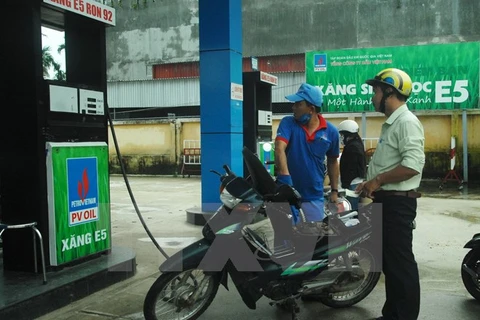Limited sales have threatened the survival of five ethanol manufacturing projects that have received hundreds of millions of US dollars in investment.
Many investors poured money into the projects after the Government kicked off a biofuel development project in 2007.
The Vietnam National Oil and Gas Group (PetroVietnam), for example, invested 300 million USD in building three ethanol factories with total capacity of 300 million litres per year in the northern province of Phu Tho, the central province of Quang Ngai and the southern province of Binh Phuoc.
Cassava and raw materials cultivated in the provinces are used to make ethanol.
In the first investment stage, the Phu Tho factory received 1 trillion VND (45 million USD), the Quang Ngai province-based Dung Quat factory 2.2 trillion VND (100 million USD) and the Binh Phuoc factory 1 trillion VND (45 million USD).
Four other investors poured money into factories in the central province of Quang Nam, the Central Highlands provinces of Kon Tum and Dak Nong, and the southern province of Dong Nai.
These areas are expected to produce 335 million tonnes of ethanol each year.
Only two of the seven ethanol factories, however, are producing ethanol. The other five have temporarily stopped operation.
Biofuel demand has been low because the government has not promoted the use of ethanol.
Only 175 of 12,000 gas stations sell biofuel nationwide, mainly in HCM City, the southern coastal province of Ba Ria - Vung Tau, the Mekong Delta city of Can Tho and central city of Da Nang.
"Customers consider biofuel as an option, and the Government has not given any support to ethanol manufacturers. If we continue to produce, we must export, but our price cannot compete, so five ethanol factories had to close," Vu Kien Chinh, General Director of Tung Lam Limited Company, was quoted as saying by Thoi bao Kinh te Viet Nam (Vietnam Economic Times).
Tung Lam is one of two ethanol producers that have continued to operate.
In addition, the price of cassava was higher than the global price, which has raised the price of Vietnamese ethanol, making it difficult to export, Chinh said.
If the factories continued to produce and export, with the current price, each litre of ethanol will take a loss of 434 VND (0.2 US cents) and each factory will lose 400 billion VND (18 million USD) each year, he said.
The Binh Phuoc Ethanol Factory invested 1 trillion VND (45 million USD) and started operation in 2009. The factory only had a trial run, and then stopped because there were not enough raw materials, even though it was located near a cassava cultivation area.
The high cassava price was also a deterrent to continued production.
After the factory closed, investors lost 270 billion VND (12.3 million USD) each year.
Investors in the other factories that have temporarily stopped operating have also been threatened with bankruptcy.
"Because of the limited area and manual cultivation, cassava prices have remained very high," Chinh said.
He said his company is working with farmers to cultivate on a large area new sweet potato that can replace cassava in producing ethanol.
"We have set the goal to reduce the price by 1,000 VND (5 US cents) for each kilo of raw material by using machinery to cultivate the potato on a huge area, with a capacity of 50 tonnes per hectare," he said.-VNA























